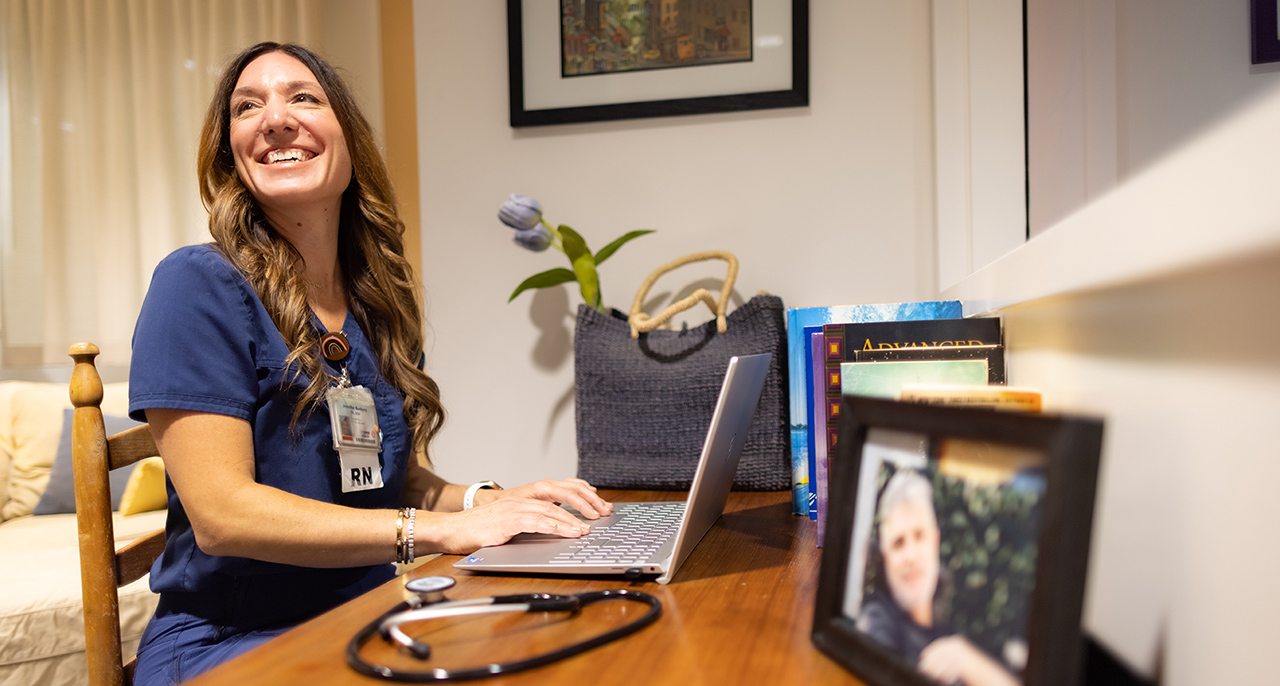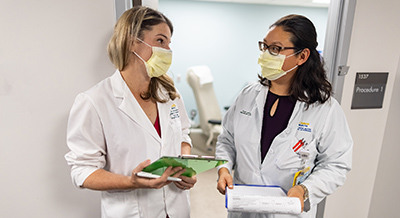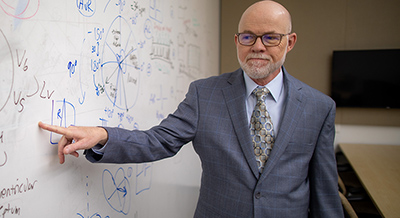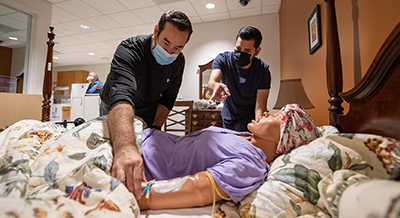Despite 20 years in clinical practice, Chris de Belen-Wilson embarked on a Doctor of Nursing Practice (D.N.P.) degree to take her perspective to an even higher level.
“I think the D.N.P., as a profession, helps to not only legitimize what we do, but enables us to be influencers in health care to optimize systems and shape policy,” she says. “I’m hoping that folks who have the D.N.P. really learn how to create system change, influence health care so that leaders are listening. And that we’re at the table making those changes and advocating for those who lack access and resources.”
System changers. Advocates. Those attributes are not just what de Belen-Wilson envisions, they are also the aspirations of the Betty Irene Moore School of Nursing at UC Davis faculty who launched the new Doctor of Nursing Practice — Family Nurse Practitioner (D.N.P.-F.N.P.) Degree Program in June.
When 30 members of the inaugural cohort began the three-year, hybrid program this year, they took a major step toward becoming change agents for health care.
“Starting a new program in the midst of today’s environment allows us access to a lot of tools that I don’t think we would have had at any other point in our history,” says Kathryn Sexson, program director. “The environment is ripe for doing what I hope everybody’s here to do, which is to improve the health and well-being of the nation that we serve.”
Sexson led the team that developed the program and wove the elements of leadership, innovative clinical practice and health equity into every facet. The result: a new curriculum that actively works to change the current narrative and develop meaningful solutions to the biggest challenges of achieving optimal health for all.
“We look at health disparities and social determinants and examine health equity from historical and societal perspectives,” explains Sexson. “We then educate our students so that they actually have a framework of cultural humility to start to break down barriers that contribute to inequities for marginalized and underserved populations.”
In order to get different outcomes, clinicians need to try different approaches. Faculty lead in a new way of thinking and re-examine outdated curriculum based on damaging assumptions.
“The Betty Irene Moore School of Nursing offers us a venue in which we can really start challenging our thinking,” Sexson says.
The D.N.P.-F.N.P. program was carefully designed to take students through a sequential series of courses and clinical experiences. The program first prepares students to think at the doctoral level about their role as a nurse practitioner and instills critical thinking in all future areas in which they could serve — administration, private practice, community-based or hospital care.
The second year of the program focuses on taking this advanced knowledge and integrating it in clinical practicums.
By shifting students’ thinking from bedside nursing to that of primary care provider, students practice and discuss with peers and mentors how to best support patients through their lifespan in multiple clinical environments.
Finally, in year three, students cumulate their knowledge and practice in a clinically based scholarly project.
While the progression may seem typical in a D.N.P. program, the approach is far from traditional and innovates to meet the ever-changing real world of health care.
“The exponential generation of knowledge and information in all areas of our world has make it literally impossible to know all the information within a discipline,” Sexson says. “Shifting from a systems-based to a concept-based curriculum develops students’ problem-solving skills so they can transfer that knowledge into a variety of situations.”
In the new School of Nursing program, concept-based curriculum begins on the very first day of instruction. That prepares students to think holistically rather than just narrowing on a singular focus — an organ or system — to build their diagnosis.
“Our patients don’t come with boxes around their hearts and lungs. They present as an integrated complex person,” explains Cara Sandholdt, an assistant adjunct professor who teaches anatomy, physiology and pathophysiology. “When we can put that together with processes and concepts in a more holistic way, we can understand a patient’s needs and treat them with a more well-rounded view.”
For Jennifer Berkery, the opportunity to be the first in a new program based on innovative ideas was a no brainer.
“I love setting big goals and putting myself out of my comfort zone,” explains the UC Davis Health nurse whose career spans 18 years. “This D.N.P. focuses on the evidence-based research, which is the knowledge I need more of to dive in and collaborate with others to provide the change that needs to happen. To be part of something so big is so amazing.”
After working three years as a registered nurse in rural parts of Northern California and Southern Oregon, inaugural student Ashley Ferreira wanted to advance her knowledge while continuing to build relationships with her patients.
“I didn’t want to leave the community I worked in,” she says. “You have so many years that you can give to your work. I love that I can continue to be there, work with them, build those relationships and still do something where I can personally grow.”
These D.N.P.-F.N.P. graduates will implement evidence-based innovations and develop expertise in their clinical practice. That work complements their Doctor of Philosophy (Ph.D.) colleagues’ work, who devote their careers to intellectual inquiry and original research.
“Ph.D.-prepared nurse scientists produce knowledge which they disseminate through publication and presentation, while the D.N.P.-prepared providers translate that knowledge into practice,” said Janice F. Bell, Doctor of Philosophy program director. “Given the current long delay in translating research into patient care, collaboration between these two roles is essential in leading change in health care.”
Trailblazing students who want to be the first in a new program can benefit from an intentionally designed curriculum that prepares advanced practice providers for the future they will face. The program reflects more than just the current moment in their education.
“Our students are committed to improving the health of populations, eliminating health inequities and advancing systems to allow us to partner effectively with patients, families and communities,” Sexson says. “They have this great potential. We want to give them the foundation to achieve it and carry them the next 25 or 30 years of their practice.”






